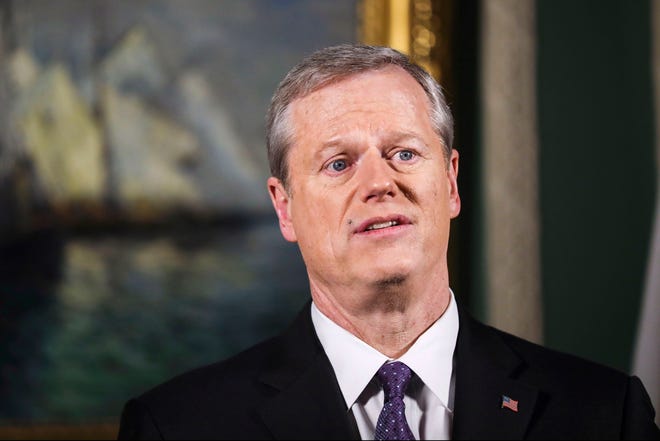BOSTON — Testifying before the Joint Committee on Telecommunications, Utilities and Energy on behalf of his legislation that commits $750 million in American Rescue Plan Act funds to invest in the clean energy industry, Gov. Charlie Baker said it was time for the state to move into a new phase.
"We filed this legislation back in October of 2021 so that we could build on the progress we've made together and ensure that, at this pivotal moment for our economic recovery and our environment, that Massachusetts has the tools it needs to remain on the leading-edge of climate action in the United States," Baker told the joint committee Tuesday.
Translation: Baker has heard the criticism about the state's solicitation process in awarding offshore wind energy contracts that favored low prices over economic benefits.
While that approach has worked in generating power contracts with offshore wind developers whose power generation prices are far below those in competing states like Connecticut, New Jersey and New York, the Baker administration has been criticized for not creating incentives that would attract offshore wind manufacturing and developers and manufacturers to the state.
"We have been dismayed by the level of investment, some 10 years into our effort now, to attract (manufacturing) here," New Bedford Mayor Jon Mitchell told the joint committee. "What has been missing from the Commonwealth's efforts ... is a set of policies aimed at out-competing other states for industry investment."
Mitchell said New York, for instance, assigns 20% of a bid score to economic development.
"Now that may strike some folks as just overly aggressive, but we've got to do something different. As we watch, the (manufacturing) industry has gone to other states that have governors who have said 'we're going to be the center of offshore wind,'" he said.
Offshore wind touted as economic development engine Although construction of the wind farms creates far more jobs than manufacturing or operations and maintenance, they are ephemeral. Manufacturing jobs last longer and employ far more people than operations and maintenance. They are considered by experts to be the golden goose of the offshore wind economy.
Energy boost: Massachusetts doubles offshore wind in power pipeline with new projects
A few years ago, Connecticut partnered with Bay State Wind to invest $93 million to develop a state pier in New London into a facility similar to one the state developed on New Bedford's Marine Commerce Terminal. Last August, the New Jersey Board of Public Utilities awarded over 3,700 megawatts to two companies contingent upon them building new manufacturing facilities at what is called the New Jersey Wind Port.
New York has invested $644 million in port and infrastructure upgrades and a year ago, the city of Albany partnered with the Norwegian wind development company Equinor, which is building the Empire Wind Farm off Long Island. The state also partnered with two Danish and U.S. companies to manufacture wind towers at a factory in Bethlehem, New York, that will create 500 jobs in the construction phase and employ 300 at the factory.
Virginia's Dominion Energy unveiled plans in October to team up with the Spanish blade manufacturer Siemens Gamesa to spend $200 million to build the first U.S. offshore wind turbine factory as part of their plan to install 180 turbines off the Virginia coastline.
Speaking to the committee Tuesday, Massachusetts Secretary for Energy and the Environment Kathleen Theoharides said Baker's legislation would remove the price cap from future energy contract bids in the hope it would encourage wind developers to submit bids that included plans for local manufacturing and other job creation.
Citing competition among developers and technology advances that promise to open up deepwater areas and build more efficient turbines, Theoharides said the offshore wind industry has demonstrated it can produce power at low cost.
Baker pointed out the price cap was removed on the state's second round of bids, and they received bids that were lower than the first round.
"We feel now is the right time to adjust our procurement process so we can capture important additional benefits for Massachusetts ratepayers," Theoharides said.
The Baker legislation creates a new Clean Energy Innovation and Investment fund administered by the Massachusetts Clean Energy Center that would provide research and development money to universities, community colleges, vocational schools and other entities for new clean energy technologies and workforce development.
Baker said the bill also transfers the authority to award energy contracts from the Department of Public Utilities to the Department of Energy Resources, which critics had said was needed to focus the offshore wind industry on economic development in the state.
Barrett: Keep price caps Committee co-chair Sen. Michael Barrett was critical of removing the price cap. Barrett felt that with only two bidders in the last round in which both received contracts, and just a handful of developers on the East Coast, there was too little competition to ensure a lower price without a cap.
"We are stuck in a situation where we're going to have to deal with a very small universe of potential players," said Barrett, who noted that with no price limit on their bids, New York, Connecticut and New Jersey energy contracts were 43%, 68%, and 100% higher, respectively, than what Massachusetts obtained with an upper limit on pricing.
Barrett was also critical of a process in which the economic package proposed by a developer is kept secret until the contract is signed, making it hard for the public, media and legislators to determine if there was benefit.
Theoharides said the administration would work with the legislature on improving that aspect of the process.
Mitchell told the panel that the offshore wind industry and the state investments in infrastructure needed to benefit so-called Gateway Cities like New Bedford, which suffered as once-thriving industries faded or located elsewhere.
"It would be consistent with state economic development policy, after all, to provide some preference for Gateway Cities," he said.


No comments:
Post a Comment